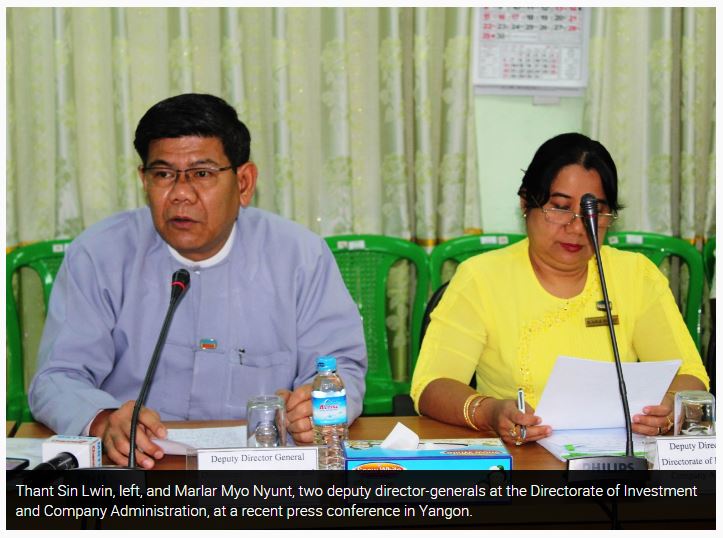Myanmar likely to open more sectors to FDI
A SURGE in interest among global players following the liberalisation of Myanmar’s education sector to foreign investors has motivated the authorities to continue opening up the economy in other restricted sectors.
Thant Sin Lwin, deputy director general at the Directorate of Investment and Company Administration (DICA), said at a press conference on Tuesday that Myanmar Investment Commission (MIC) has been keeping an eye on the latest developments in the investment scenario to decide which sector should be liberalised first.
“We are trying to catch up with our neighbours. We may liberalise the insurance sector in our next move, as many insurance companies have visited us to discuss about expansion of their services and products in Myanmar,” he said. “But honestly, we have not decided anything yet, though insurance is a sector with high potential for liberalisation. We also need to take China’s Belt and Road initiative into serious consideration.”
According to the statistics, 24 foreign insurance companies has established their representative offices in Myanmar while 12 private local firms and state-owned Myanma Insurance Enterprise are offering a range of products to customers.
According to Thant Sin Lwin, investment bosses receive insurance companies that are willing to do business in Myanmar very often. Last week, senior executives at China Export & Credit Insurance Corporation visited Aung Naing Oo, secretary of MIC and director general at DICA, in Yangon to discuss about their investment plans.
He seems pretty satisfied with the outcome of liberalising the education sector. Many multinational players have visited the DICA office to discuss about their potential investments in the establishment of private international schools in Myanmar, he said.
“Some of them already prepared to submit their investment proposals to MIC. But the investors are also required to seek the education ministry’s approval, as it will serve as the regulator. Simultaneously, they are also in active discussions with the ministry,” he said.
The official said some international schools already present in Yangon have also contacted the commission to ensure getting involved in the liberalisation process and thereby largely benefit from that. Among them is the Myanmar International School, formerly known as the Diplomatic School, which has been operating in Yangon for six decades.
In the last MIC meeting on May 12, Myanmar approved four new foreign enterprises and 10 local companies to do business in manufacturing, services, agriculture, real estate, energy, and hotels and tourism. The approval would create nearly 12,000 new jobs for locals, said the official.
At the meeting, the commission approved the investment proposal by Singapore’s Coffee Concepts (Myanmar) Limited that will officially bring the Starbucks brand to the country.
“In their investment proposal, they have planned to open more than 20 Starbucks shops across the country. But they have yet to describe their business details, for example, when and where these branches will be opened,” he said.
The official said the firm had committed to invest US$6 billion after their preparation period of nine months. Marlar Myo Nyunt, another deputy director general at DICA, said Myanmar would attract more foreign investors through investment fairs to be held nationwide.
With the support of Japan International Cooperation Agency, the DICA has been organising several investment fairs in big cities since its very first event in Mandalay in September 2015. Last year, similar events were held in Taunggyi of Shan State and Hpa-an of Kayin State.
“We are planning to hold another investment fair in Ayeyarwady Region, perhaps in November when the rainy season ends,” she said.
After the success of Yangon Investment Forum last week, Kayah State will hold a similar event on May 26. There, three sectors namely agriculture, mining, hotels and tourism would be prioritised to attract new investors.
“The state government of Kayah is really eager to invite local and foreign businesses to invest in the region. They are more than willing to showcase their strengths and incentives to global players next week,” she said.
Source: http://www.nationmultimedia.com/detail/Economy/30345565


 Thailand
Thailand




